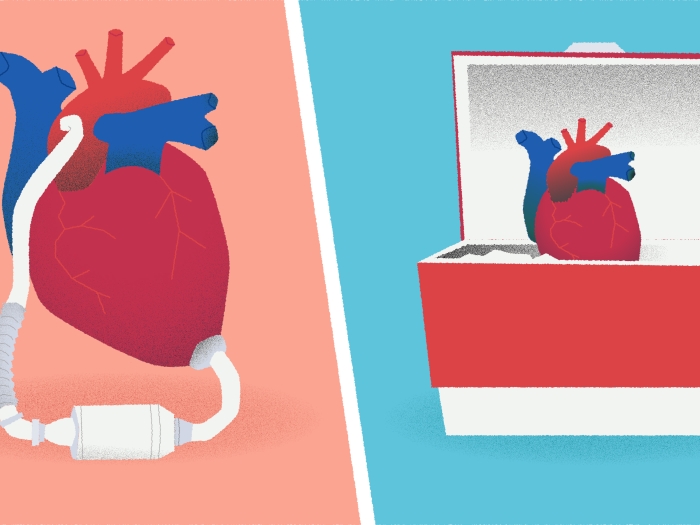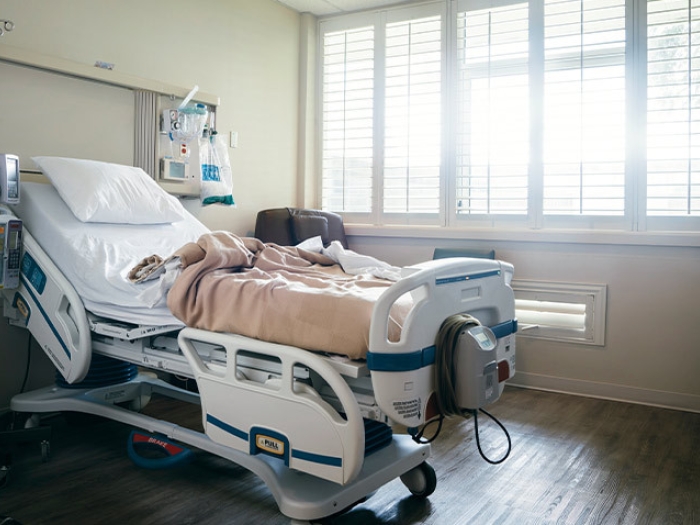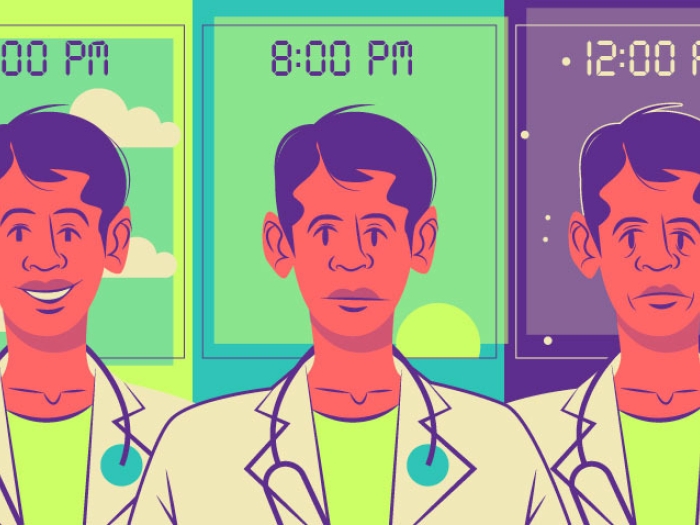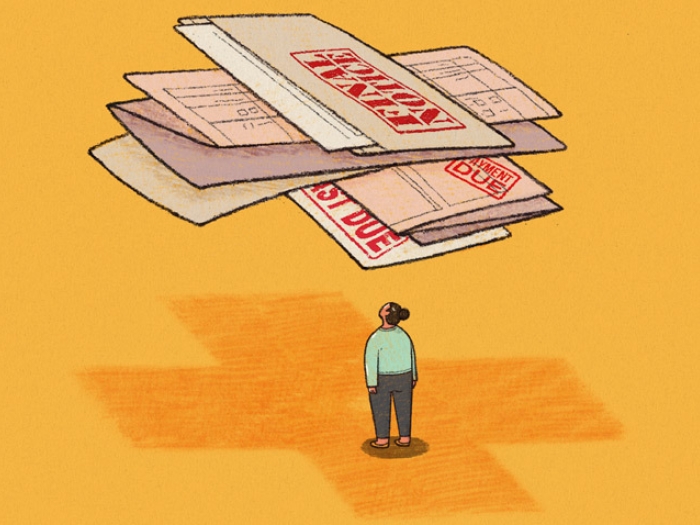Health care coverage for low-income patients produces fiscal benefits that include lower unpaid debts, fewer bankruptcies and higher credit scores.
1:00 PM
Author |

Low-income Michigan residents who enrolled in a new state health insurance plan didn't just get coverage for their health needs. Many got a boost in their financial health.
LISTEN UP: Add the new Michigan Medicine News Break to your Alexa-enabled device, or subscribe to our daily audio updates on iTunes, Google Play and Stitcher.
People who gained coverage under the state's expanded Medicaid program have experienced fewer debt problems and other financial issues than they had before enrollment, a new analysis of thousands of enrollees shows.
In fact, those who had the most health problems felt the most financial relief after enrolling in the Healthy Michigan Plan, which covers more than 650,000 people in the state, according to the findings of a team led by a University of Michigan health economist.
The study shows drops in unpaid debts — medical debts and overdrawn credit cards in particular — and fewer bankruptcies and evictions after enrollment. Meanwhile, enrollees' credit scores and approvals for car loans rose. Those with chronic illnesses or who had a hospital stay or an emergency department visit after they enrolled saw the largest financial effects.
Economist Sarah Miller, Ph.D., of U-M's Ross School of Business, published the paper on the site of the National Bureau of Economic Research with colleagues from the Federal Reserve Bank of Chicago, University of Illinois at Chicago and Northwestern University.
Enrollees reap savings
The team worked with the Michigan Department of Health and Human Services, which runs the Healthy Michigan Plan, to obtain information about more than 322,000 enrollees without needing to access their identifiable data.
Using a double-blind procedure, they matched the data with enrollees' credit reports and studied them as a group.
MORE FROM THE LAB: Subscribe to our weekly newsletter
The researchers focused on people who enrolled in the program's first year, starting in April 2014, and hadn't had health insurance before they joined. The team looked at individual-level financial information from several years before — and at least a year after — enrollment.
Resulting improvements were widespread, they found.
"Across the board, we saw a pretty sizable effect, not just on unpaid medical bills, but also unpaid credit card bills, and on public records for evictions, bankruptcies, wage garnishments and other actions," Miller says. "Enrollees' financial well-being seems to improve when they can get the medical care they need without having to put it on a credit card. And the largest effects are among the sickest enrollees."
Miller, who is a member of the U-M Institute for Healthcare Policy and Innovation, notes that research from IHPI and other teams has shown that Medicaid expansion has resulted in more people having health insurance, getting access to care and receiving care.
An IHPI team recently reported that physicians say their patients who have Healthy Michigan Plan coverage are becoming healthier and more able to work. Previous IHPI research showed hospitals in Michigan have less uncompensated care than before.
In general, Miller notes, one of the main goals of health insurance of all kinds is to protect people from financial losses when they get sick or injured. But no studies have looked at the financial impact of coverage across such a large population of Medicaid expansion enrollees or allowed researchers to compare members of enrollee subgroups.
Enrollees' financial well-being seems to improve when they can get the medical care they need without having to put it on a credit card.Sarah Miller, Ph.D.
Financial gains after enrollment
Because the new study matched Medicaid records with individual credit reports, it gives a highly detailed picture of what was going on in enrollees' financial lives as a group. The review also allows for analysis of subgroups and relatively rare financial events (such as bankruptcy) that lead to public records.
The research also illustrates the sharp and immediate drop in financial issues after the individual's enrollment date, which suggests that enrollment — not a gradually improving economy — was the key factor.
The study shows that enrollment in the Healthy Michigan Plan:
-
Reduced the medical bills in collections for the average enrollee by 57 percent, or about $515
-
Reduced the debt past due but not yet sent to a collection agency by 28 percent, or about $233
-
Led to a 16 percent drop in public records for financial events such as evictions, bankruptcies and wage garnishments; bankruptcies alone fell by 10 percent
-
Resulted in enrollees being 16 percent less likely to overdraw their credit cards
-
Led to a rise in individual credit scores, including the number with a "deep subprime" rating falling by 18 percent and the number listed as "subprime" falling by 3 percent
-
Allowed enrollees to engage in more borrowing to buy cars or other goods and services, which is consistent with better credit scores. Enrollees experienced a 21 percent rise in automotive loans. Other studies have found that Medicaid expansion reduced use of payday loans and reduced interest rates for low-income people.
-
Reduced bills sent to collection and led to bigger credit score increases for people with chronic illnesses and those who had a hospitalization or an emergency department visit during the study period
Miller and her colleagues also cite survey data from the official evaluation of the Healthy Michigan Plan that another IHPI team is carrying out. The survey found that in the year before they enrolled in the Healthy Michigan Plan, 45 percent of enrollees had trouble paying medical bills and 25 percent skipped necessary care because of costs. These measures dropped after enrolling.
Continued review and risks
Enrollment in the Medicaid expansion program is limited to adults with household incomes under 133 percent of the federal poverty level. The average household income for enrollees in the study was $4,400 for an individual and $7,500 for a family of three.
Seventy percent of people reviewed in the study had a chronic illness and had been to an emergency department once in the past year, on average.
SEE ALSO: Medicaid Expansion Helped Enrollees Do Better at Work or in Job Searches
More than 80 percent had credit scores in the subprime (in this case, a FICO score of 600 or lower) or deep subprime (500 or lower) range. Their total debt in collections, medical debt in collections and past-due amounts were higher than a random national sample of credit reports.
Miller cautions that another roadblock lurks: "This study also suggests that people at risk of losing Medicaid because they don't complete a work requirement or paperwork could be at a great financial risk, even if they do not have a chronic illness or a major medical issue. They're the ones at risk of losing their coverage, and it won't just mean they can't go to the doctor."
The new study's results build on those from Oregon, which expanded Medicaid before the rest of the nation was able to do so under the Affordable Care Act. An evaluation of that program also showed positive financial effects.
Miller and her colleagues are continuing their work to quantify the financial impact of Medicaid expansion in national data. They recently published one national study in the Journal of Public Economics that uses aggregate, not individual, data to show a positive impact of Medicaid coverage on debt in collections among people living in poorer areas with histories of high rates of uninsurance.

Explore a variety of health care news & stories by visiting the Health Lab home page for more articles.

Department of Communication at Michigan Medicine
Want top health & research news weekly? Sign up for Health Lab’s newsletters today!





